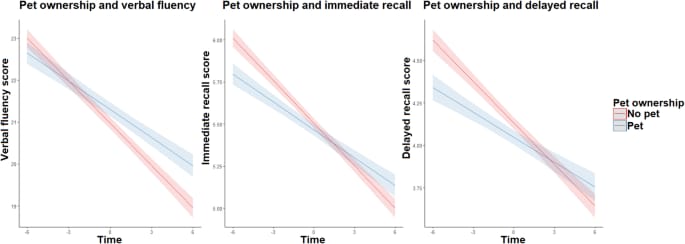- Dog Juice
- Posts
- Science Says Your Dog Is Secretly Turning Back Your Brain’s Clock—Here’s How!
Science Says Your Dog Is Secretly Turning Back Your Brain’s Clock—Here’s How!
The Fountain of Youth? More like a Fur-ountain amirite?!
Study Reveals Pets The Key To Anti-Aging

Imagine your four-legged friend as a tiny personal trainer for your gray matter—no sweatband required! In a landmark 18-year survey of over 50,000 Europeans aged 50+, researchers led by Adriana Rostekova at the University of Geneva discovered that owning a cat or dog isn’t just good for your heart—it helps keep your brain spry too. Specifically, dog owners enjoyed a gentler decline in both immediate and delayed recall, while cat owners saw their verbal fluency slide more slowly compared to non-pet parents.
But before you rush out for a fishbowl, take note: the benefits didn’t extend to all critters. Bird and fish aficionados showed no significant cognitive edge, possibly because shorter lifespans limit deep emotional bonds with fish, and noisy birds can interrupt your slumber (and sleep quality is tightly linked to brain health). As Rostekova puts it, “interaction with dogs and cats provides unique cognitive stimulation, which may be less pronounced in other, less demanding pets.”
What kind of “stimulation,” you ask? Think prefrontal cortex bootcamp. A controlled trial using functional near-infrared spectroscopy (fNIRS) found that healthy adults exhibited ramped-up prefrontal activation—and stronger attentional processes and emotional arousal—when cozying up to a live dog versus a plush toy. And feline fans aren’t left out: hemodynamic measurements revealed that petting a real cat lights up the left inferior frontal gyrus more than a mere pat-down, hinting at brain workout courtesy of their famously unpredictable temperament.

This puppy-powered fine-tuning isn’t just European news. Back in 2022, neuroscientists at the University of Alabama reported that pet owners, especially dog devotees, not only performed better on memory and attention tasks but even sported larger brain structures—and could look up to 15 years younger in “brain age” than non-owners. Want more reasons to get a pet if you don’t already have one?
Health Benefits of Pet Ownership

Here are ten of the most robust, scientifically demonstrated ways that dogs benefit human health—each backed by a peer-reviewed study:
Lower cardiovascular risk
Dog ownership is “probably associated with decreased cardiovascular disease risk.” pubmed.ncbi.nlm.nih.govGreater longevity & better survival after major heart events
Compared to non–dog-owners, people with dogs had a 24 % reduced risk of dying from any cause, a 31 % reduced risk of cardiovascular death, and a 65 % reduced risk of death after a heart attack. heart.orgReduced stress hormones & blood pressure
Simply petting a dog lowers cortisol (the stress hormone) and helps keep blood pressure down. hopkinsmedicine.orgIncreased physical activity
Dog owners walk more: pet ownership is independently associated with higher overall activity levels, which in turn drive many of the cardiac and metabolic benefits. pubmed.ncbi.nlm.nih.govBuffering of perceived stress in children
In a controlled lab stressor, children with their pet dog present showed significantly smaller spikes in self-reported stress (even more so than with a parent) and lower cortisol responses. pmc.ncbi.nlm.nih.govBoosted brain attention networks
Interacting with a live dog (vs. a plush toy) increased prefrontal cortex activation by 0.80 μmol/L oxygenated hemoglobin, indicating stronger attentional processes and emotional engagement. journals.plos.orgEnhanced social support & reduced loneliness
Dog owners report significantly greater perceived social support—and correspondingly lower depression scores—than people who intend to get a dog but haven’t yet. journals.plos.orgLower childhood asthma risk
Exposure to a family dog in early childhood was linked to a 13 % reduction in school-age asthma incidence. nature.comProtection against food allergies in infancy
Infants living with at least one dog at three months of age had a 90 % lower odds of developing food allergies by age one (and none of those with two dogs did). pubmed.ncbi.nlm.nih.govSymptom relief in PTSD
Among PTSD patients paired with service dogs, 84 % reported significant symptom reduction and 40 % were able to decrease medication use. hopkinsmedicine.org

With dementia rates on the rise, these tail-wagging findings could revolutionize preventive health. As economist and cat-and-dog lover Andrew Scott notes, “As we live longer and need to focus on preventive measures that keep us healthy for longer… having a pet can be fun and if it keeps you healthy, that’s a great bonus” according to The Guardian. So the next time your furry pal demands a walk (or a lap), remember: they’re not begging for attention—they’re volunteering as your brain’s ultimate personal trainer.
“The Squeeze”: Dog News In 60 Seconds

Today’s Last Laugh:
I would give anything to sleep like this:
@sifandthor Cooch out and everything #fyp #dogsoftiktok #goldenretriever #goldenretrieverlife #puppy